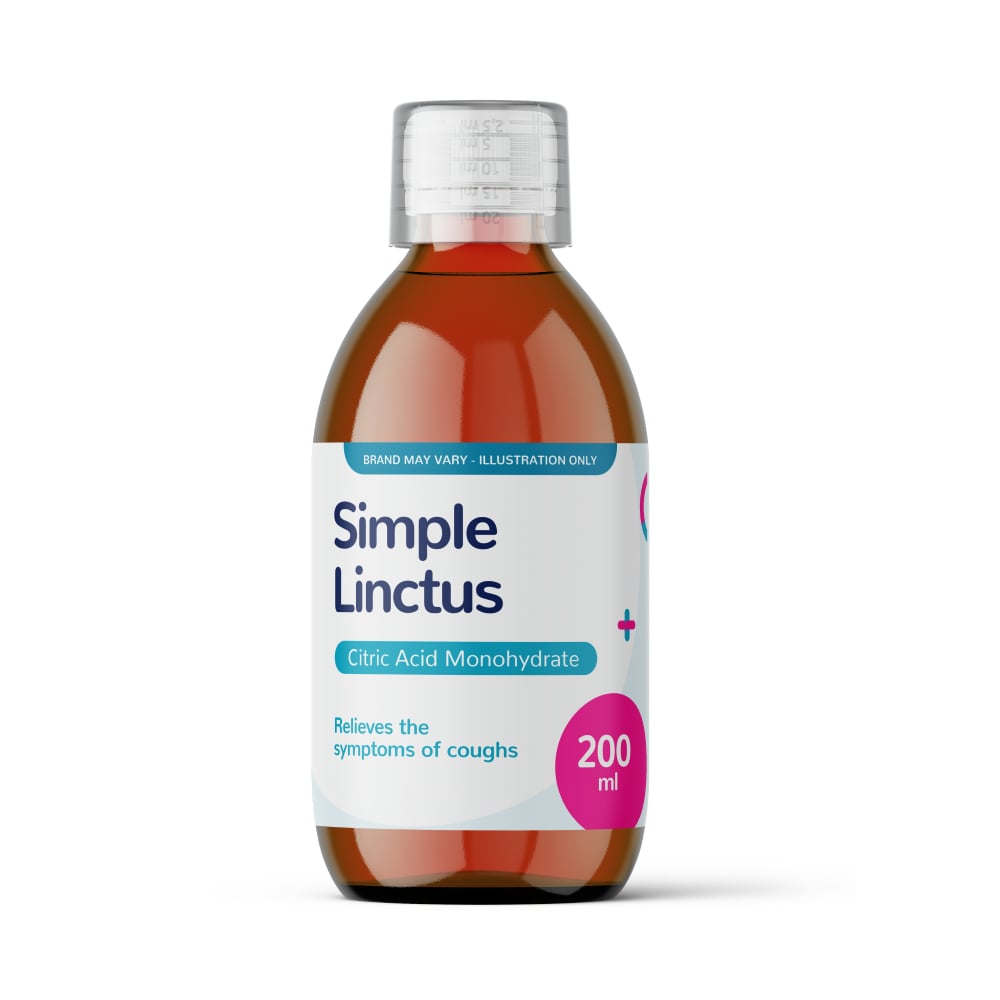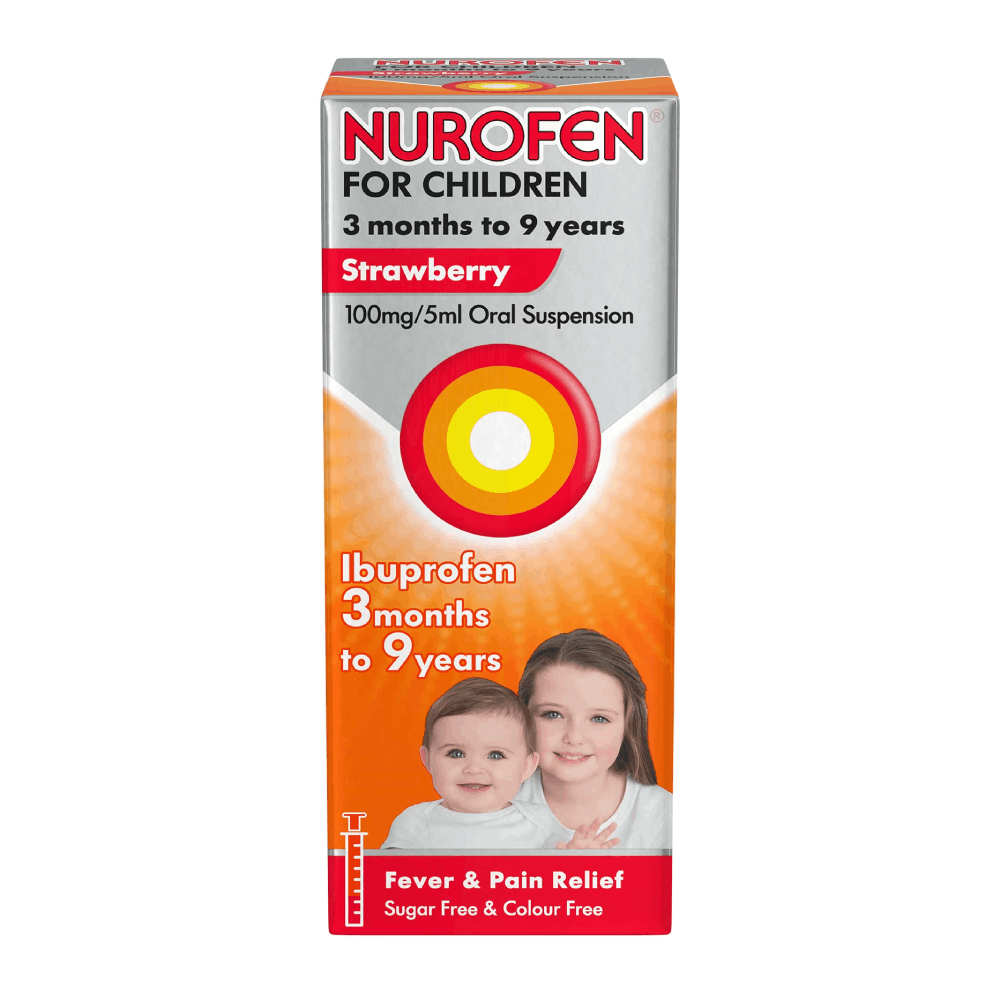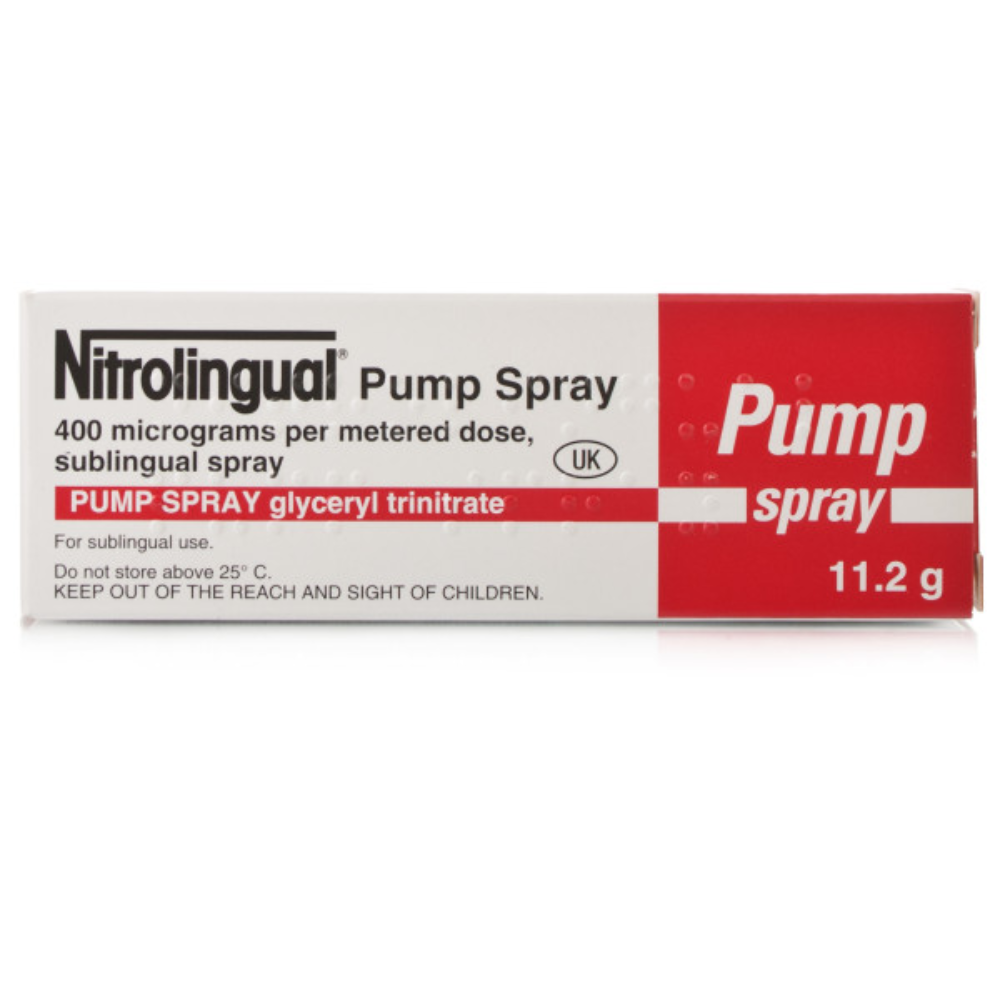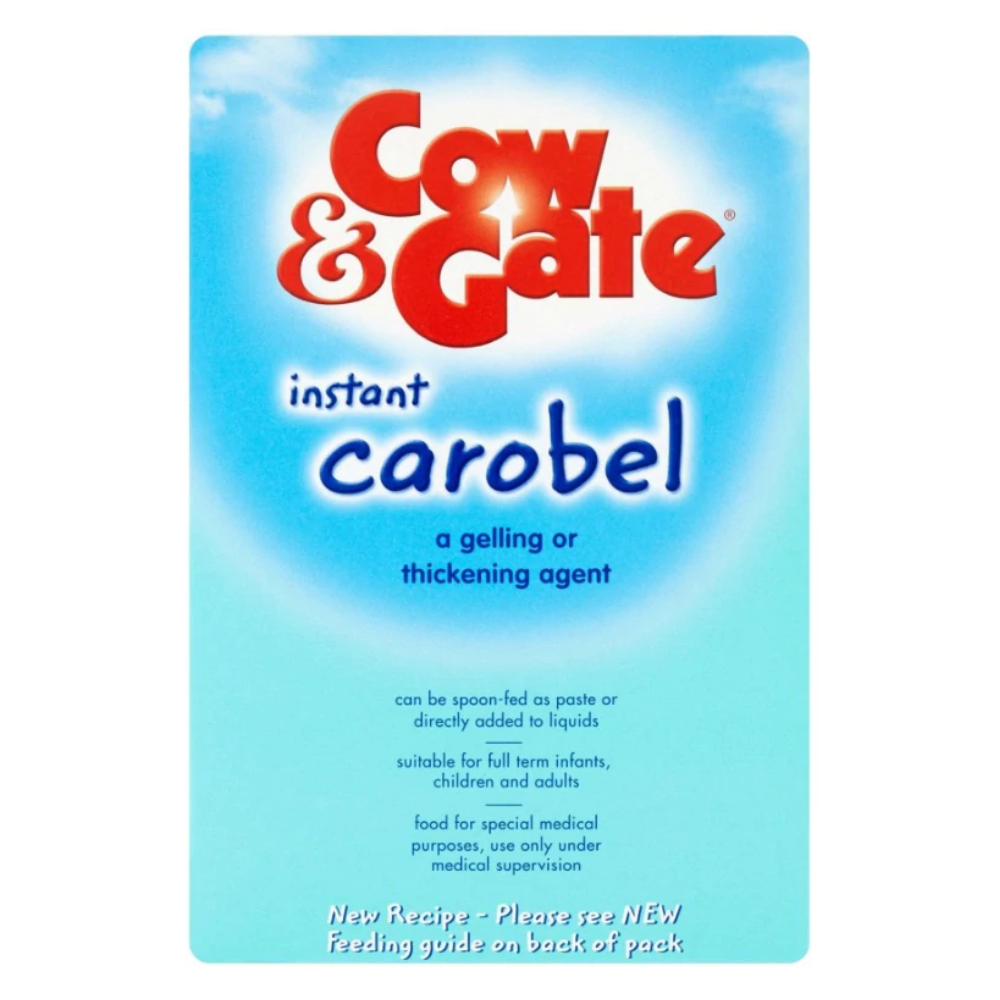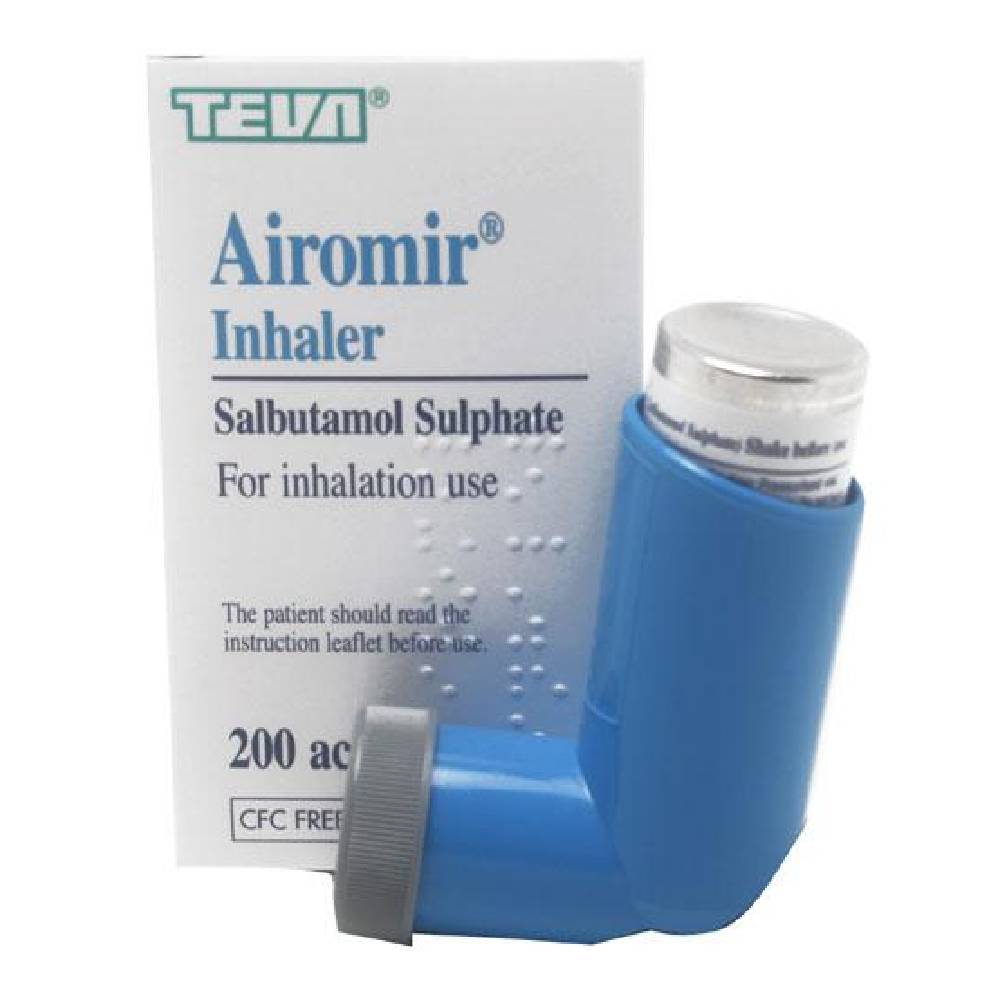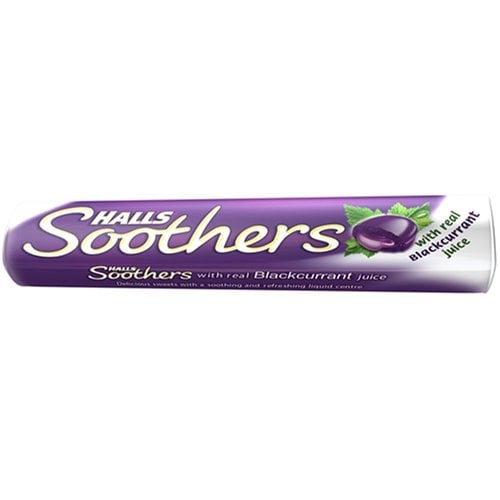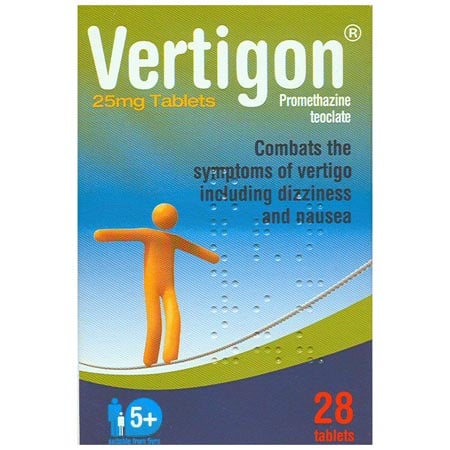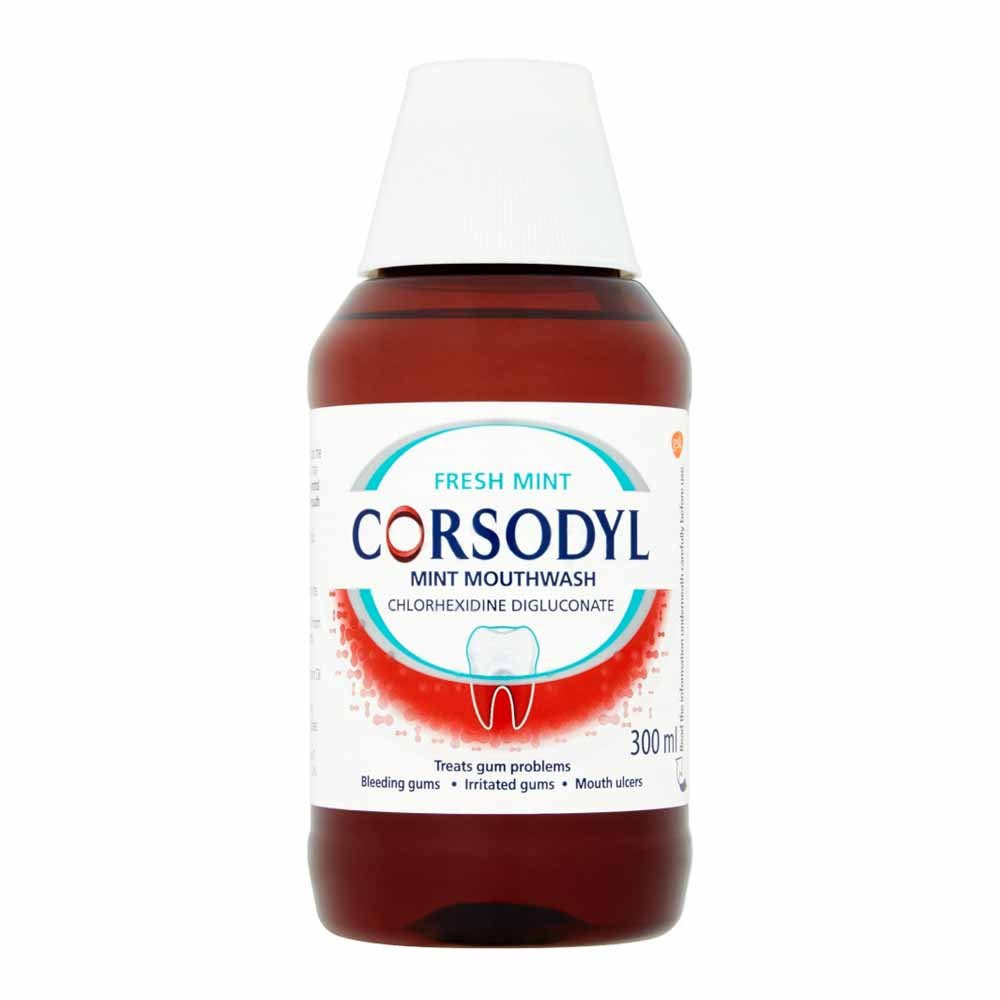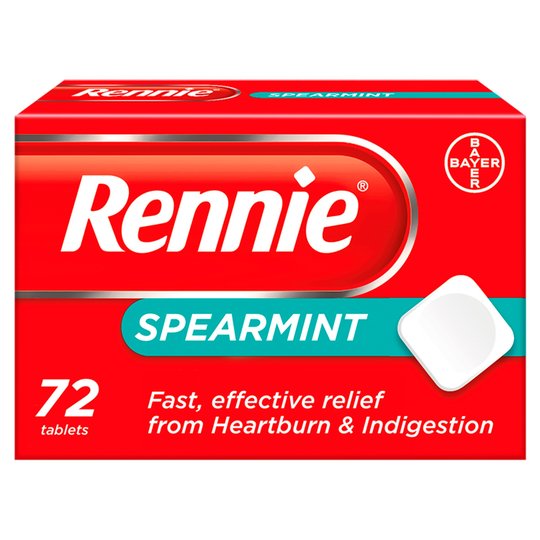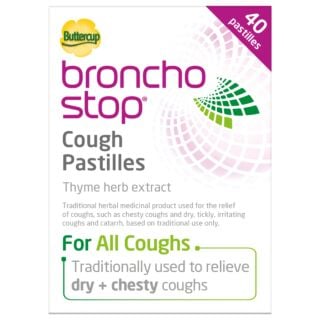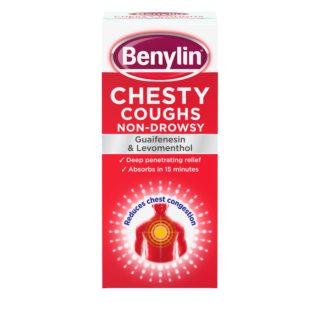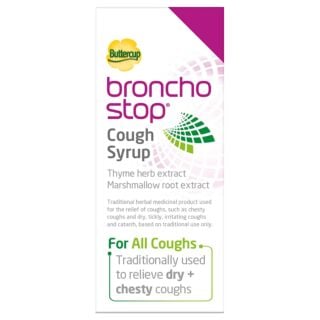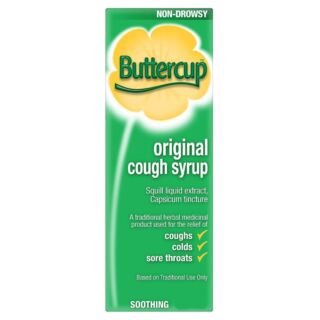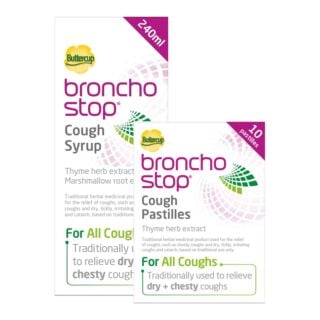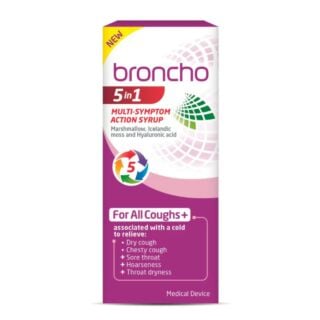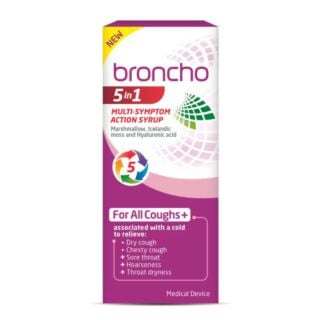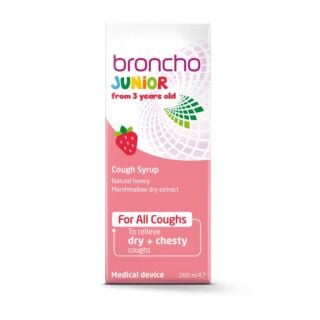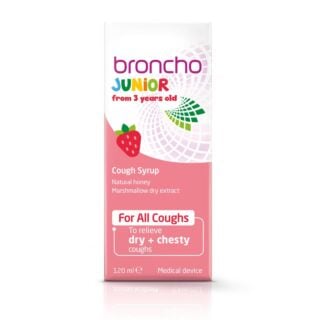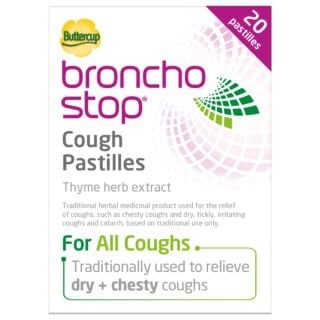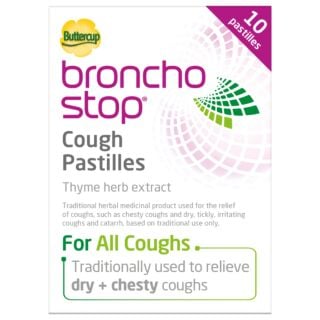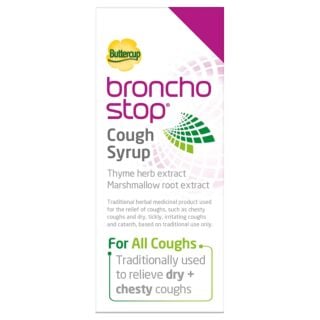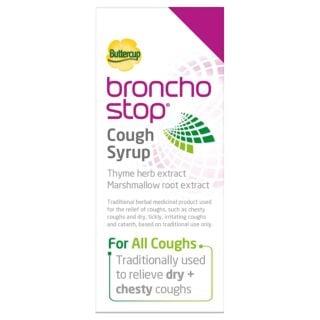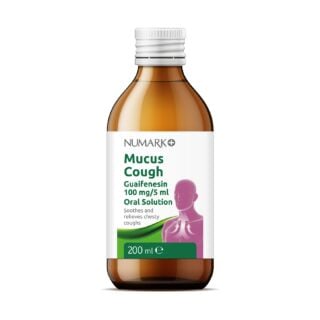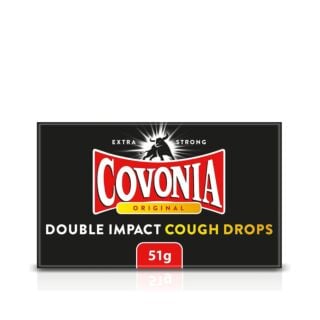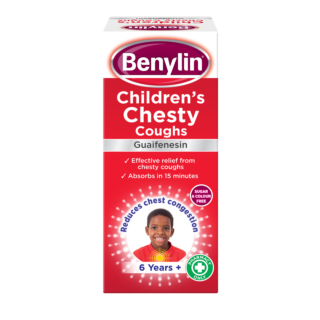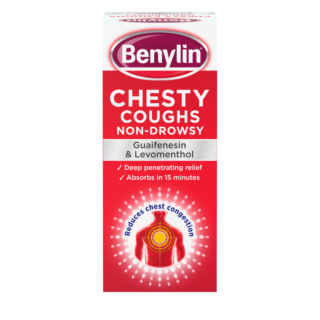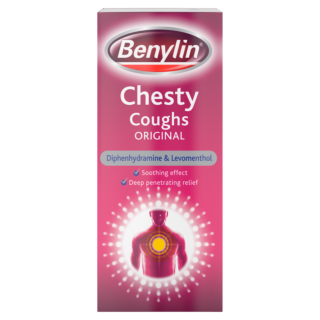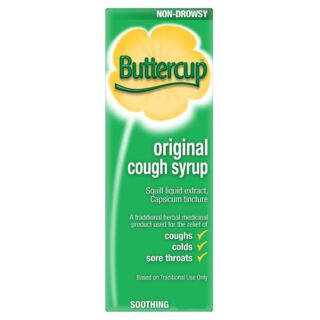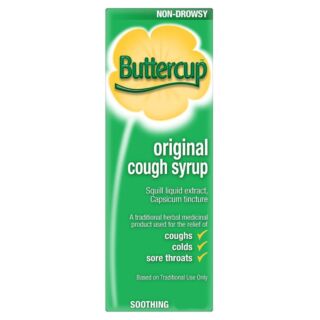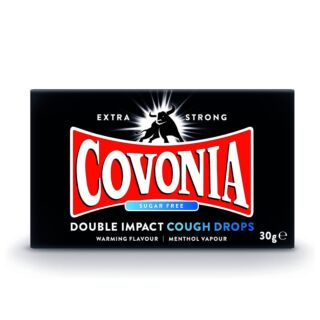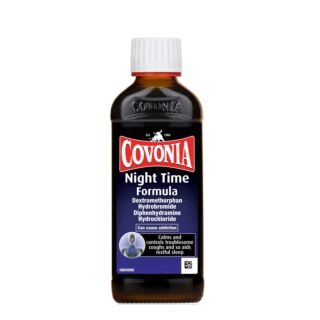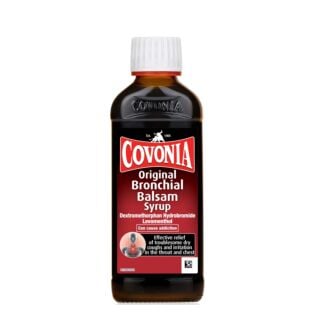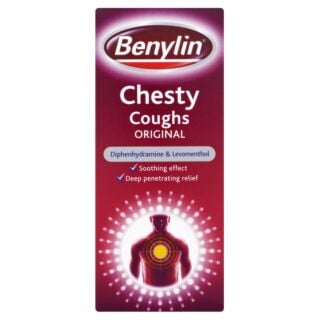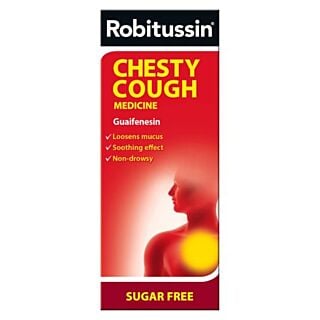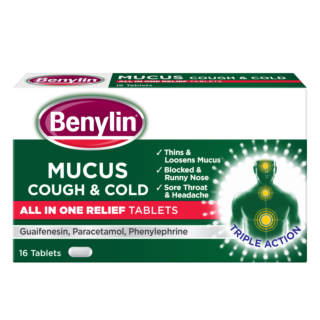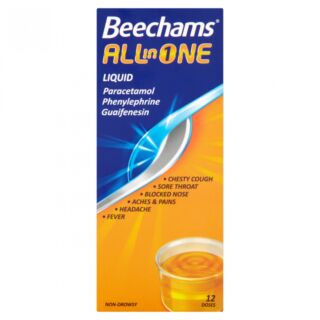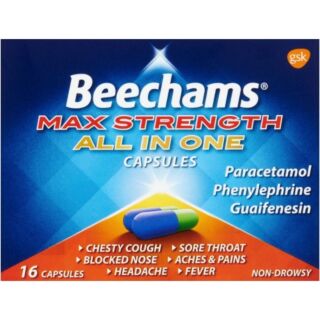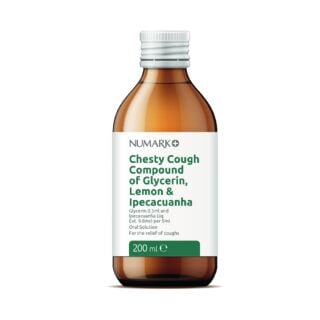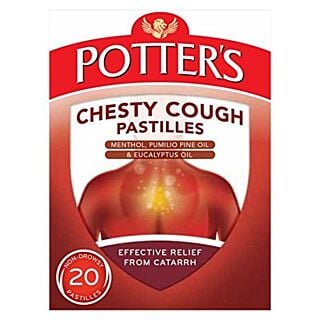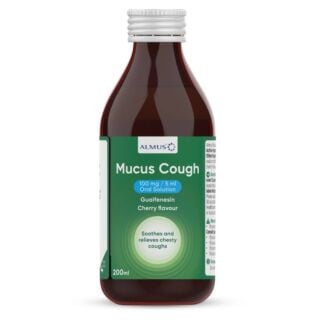Chesty Cough
Everyone’s had a chesty cough and a tight chest at some point or other. Unfortunately, a chesty cough can take up to three weeks to leave, causing you to assure people around you that you’re “actually fine, it’s just an old cough” several times a day.1,2 … Read More See less
While a mild cough can be incredibly irritating and even hinder your ability to get a good night’s sleep, it’s rarely a cause for concern. Most coughs and chesty coughs tend to clear up on their own over time, with a little help from chesty cough suppressants and other cough mixtures for chesty coughs along the way.1,2
However, there are some instances when you should speak to a GP about a cough and even some symptoms that indicate the need to seek urgent care. In this article, we’ll take you through what these are and how to treat a chesty cough.
What is a chesty cough?
A cough is a natural reflex that enables your body to remove phlegm and irritants (e.g. dust or smoke) from your upper airway (your throat) and lower airway (your lungs).1,2
Before you cough, an irritant stimulates nerves that send a message to your brain.3 The brain tells the muscles in your chest and stomach area to force out the irritant by pushing air out of your lungs.3 So, while it’s annoying, coughing helps your body to protect itself from irritants.2
Depending on the underlying cause and how long you’ve had it for, there are a few different types of cough:2,4
- Acute cough – occurs suddenly and lasts for two to three weeks
- Subacute cough – lingers after you’ve had an infection and lasts between three to eight weeks
- Chronic cough (or persistent cough) –continues for longer than eight weeks
- Refractory cough – a chronic cough that doesn’t get better with treatment
A dry cough doesn’t produce any phlegm.1,2 However, a chesty cough is also known as a ‘wet cough’, as it produces phlegm that you cough up to help clear your airways.1,2,5
What causes a chesty cough?
The main things that make you cough are irritants or allergens and medical conditions. Of these, the following can cause a chesty cough:1,2,4,6–12
- Smoking – the chemicals in nicotine can damage the small hairs (cilia) which line your airways and cause your airways to produce more mucus than usual
- Mould – black mould produces spores which can enter the air and cause an allergic reaction when you breathe them in
- A cold or flu – a respiratory infection due to a cold or flu can cause your airways to produce more mucus
- Whooping cough (pertussis) – causes intense bouts of coughing, hacking and even vomiting. This characteristic cough sounds like a ‘whoop’
- Acute and chronic bronchitis – inflammation of the bronchial tubes that carry air into your lungs
- Pneumonia – a lower respiratory tract infection caused by bacteria, viruses, or fungi
- Asthma – a chronic condition which generally causes a dry cough but causes a wet cough in some people
- Chronic obstructive pulmonary disease (copd) – an umbrella term for a group of lung conditions that affect the tiny air sacs within the lungs or the bronchial tubes
- Postnasal drip – when mucus from your nose and sinuses drips down the back of your throat and triggers a cough
- Heart conditions – if the heart has difficulty pumping blood throughout the body it can cause fluid to leak into the air sacs within the lungs
- Bronchiectasis – when chronic inflammation causes the surface tissue of the bronchial tubes to become thick, floppy, and scarred, resulting in excess mucus production
When you should see your GP for a chesty cough
According to the NHS, you should speak to your GP if you have:1
- Breathlessness which is not getting better
- Had a burning chesty cough for more than 3 weeks
- Symptoms that are not improving or are affecting your daily life
Your GP may want to conduct some further tests to find out what’s causing your cough.1 For example, they may:1,13
- Listen to your chest with a stethoscope
- Refer you for a chest x-ray
- Refer you for allergy or breathing tests
- Send a sample of your phlegm to a lab to be studied for signs of infection
- Refer you to see a specialist, though this is rare
When to seek urgent care from your GP
You should contact your GP practice for an urgent appointment if you:1
- Are experiencing more shortness of breath than usual
- Are in pain when breathing in or coughing
- Are feeling confused, dizzy, or lightheaded
- Feel sick or are being sick
- Are coughing up blood
- Have heart palpitations (feel like your heart is racing, going too slowly or skipping a beat)
- Are urinating less than usual
- Have a very high or low temperature
When to phone 999 or go to A&E
You should phone 999 or go to A&E if you experience:1
- Severe difficulty breathing
- Severe chest pain, pressure, tightness or squeezing in the middle of your chest that isn’t going away
- Pain that is spreading to your arms, back, neck and jaw
- Fatigue
- Lips or skin turning very pale, blue or grey (this is easier to see on the palms of your hands if you have brown or black skin)
As well as the above, phone 999 or go to A&E if you child is:
- Breathing fast, stopping breathing or pausing breathing
- Pulling in at their throat area or if their windpipe is more prominent
- Is limp, floppy or not responding like they normally do
- Is less than 3 months old and has a temperature of 38°c or above or 36°c or less and has not had a vaccination in the past 2 days
How to treat a chesty cough
If you have an acute cough, you may not need any treatment.1,13 However, if you’re wondering which is the best cough mixture for chesty coughs, you can use:13
- Chesty cough syrups
- Medications for chesty coughs (although, there is no evidence to support the use of these and they should not be given to children under the age of six)
- Cough sweets
- Paracetamol or ibuprofen
- A hot drink made with lemon and honey
- Pelargonium (a herbal medicine)
In addition, you should make sure you get plenty of rest and fluids.1
Following these tips will not cure your cough but can help you to manage the symptoms while you recover naturally.13 Speak to a pharmacist if you’re looking for a chest cough mixture for an infant or newborn.
How to prevent a chesty cough
No one wants a cough, especially because once you get one there is no miracle cure. This means the best method to avoiding a cough is prevention.
You can avoid getting a chesty cough by:2
- Staying up to date with your influenza, COVID-19 and pneumonia vaccinations
- Avoiding people who are ill, to prevent the spread of infections
- Avoid touching your eyes, nose and mouth
- Washing your hands often with soap and water and/or using hand sanitiser
- Identifying any allergies that are causing you to cough and avoiding irritants
Sources
- https://www.nhsinform.scot/illnesses-and-conditions/lungs-and-airways/cough/
- https://my.clevelandclinic.org/health/symptoms/17755-cough
- https://www.mayoclinic.org/symptoms/cough/basics/definition/sym-20050846
- https://cks.nice.org.uk/topics/cough/
- https://www.healthdirect.gov.au/cough
- https://www.medicalnewstoday.com/articles/327442#overview
- https://www.healthline.com/health/wet-cough#causes
- https://londonchestspecialist.co.uk/2023/05/08/understanding-different-types-of-coughs-wet-vs-dry/
- https://www.webmd.com/lung/productive-cough-causes
- https://www.bupa.co.uk/newsroom/ourviews/smokers-cough
- https://www.medicalnewstoday.com/articles/327442#overview
- https://my.clevelandclinic.org/health/diseases/24862-black-mold
- https://www.nhs.uk/symptoms/cough/

Free delivery when you spend over £39

100% discreet delivery for every item ordered

Fully regulated UK pharmacy
Are there any home remedies for a chesty cough?
If you have a chesty cough then the best thing to do is get plenty of rest and drink lots of fluids.
These will help your body to recover from the cold, flu, or other infection that’s causing your cough, and therefore help to ease the cough itself.
You can also try to make a hot drink with honey and lemon, which may help to soothe your irritated throat.
Are Bronchostop cough medicines suitable for kids?
Bronchostop Syrup and Bronchostop Pastilles are suitable for adults and children over 12.
If you’re looking for a cough remedy for a child younger than 12, Bronchostop Junior is suitable for children aged 1 and over.
Do I have a dry cough or a chesty cough?
There are two common types of cough, a dry, tickly cough and a chesty, mucus cough, and they’re pretty easy to tell apart.
If you have a dry cough you won’t produce any mucus or phlegm when you cough.
On the other hand, if you have a chesty cough you’ll bring up phlegm when you have a good coughing session.
Different types of cough need different types of cough medicine, which is why there are so many available.
What is a cough?
A cough is a reflex action when your airway is blocked by mucus or irritants.
Coughing to clear the throat of mucus or irritants is an uncommon action, though conditions can make it a more common occurrence.
Coughs typically improve after around 2 weeks, though they can last much longer.
What is the best medicine for treating a cough?
The best treatment for treating a cough is dependent on the type of cough that you have. If you have a dry or tickly cough then the medication that you should use will be different than the one you should use for a chesty or mucus cough. For more information on the best types of cough medicine to use, check out our guide in the link below.
What is the best remedy for a cough?
When you’ve got a cough, it’s important to rest and drink plenty of fluids so you can let your body recover.
There are some treatments that can help to ease your symptoms too, such as cough syrup, cough medicine and cough sweets.
There are several varieties based on whether your cough is a dry, tickly or mucus cough.
What is the cause of a cough?
A cough can be caused by a number of different conditions. The most common cause of a cough is a virus, such as a cold or the flu. Other causes of a cough include laryngitis, sinusitis, bronchitis, and pneumonia. A long-term cough, known as a persistent cough, can be caused by conditions such as asthma, smoking, or a gastro-oesophageal reflux disease which is caused by leaking stomach acid getting into the throat. In rarer cases, a cough can be a symptom of lung cancer or heart failure.
Which chesty cough medicine is suitable for babies?
Children’s cough medicine for chesty coughs is usually only suitable for kids aged 6 and over and is not right for babies.
If your baby or young child has a chesty cough, we’d recommend asking your doctor or pharmacist for advice, as they can recommend suitable treatment and doctors can provide a prescription if needed.

